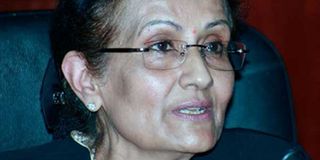Why sitting judges should avoid personal litigation

Deputy Chief Justice Kalpana Rawal. Deputy Chief Justice Kalpana Rawal, Justice Philip Tunoi of the Supreme Court and Justice David Onyancha of the High Court are currently involved in litigation with respect to the retirement age of judges. FILE PHOTO | NATION MEDIA GROUP
What you need to know:
- At the heart of the matter is the Judicial Service Commission’s resolve that all judges retire at the age of 70 years whether recruited under the former or current Constitution.
- The judges involved in personal litigation should understand that it affects their reputation, public perception and integrity of the Judiciary.
- By representing clients in court, the public may perceive that former judges have an unfair advantage because they would be appearing before their friends on the Bench.
Deputy Chief Justice Kalpana Rawal, Justice Philip Tunoi of the Supreme Court and Justice David Onyancha of the High Court are currently involved in litigation with respect to the retirement age of judges.
At the heart of the matter is the Judicial Service Commission’s resolve that all judges retire at the age of 70 years whether recruited under the former or current Constitution.
I will walk gingerly on the issue since the matter is sub- judice, but I will attempt to break through the jargon, if not balderdash, that all too often permeates our profession, to offer clarity in its purest form on the question of whether judges should involve themselves in personal litigation.
PERSONAL LITIGATION
Judges, like any other citizen, have the right to act in the protection of their rights and interests.
But I have a problem with sitting and retired judges litigating and representing clients in the courts respectively.
Judges should be circumspect about becoming involved in personal litigation.
A judge, as a litigant, runs the risk of appearing to take advantage of his or her office and, conversely, of having his or her credibility adversely judged by judicial colleagues and thereby may adversely affect public perception as to the administration of justice.
A judge should always be aware that the judicial system is for the benefit of the litigant public, not the Judiciary.
PERSONAL LITIGATION
The judges involved in personal litigation should understand that it affects their reputation, public perception and integrity of the Judiciary.
Indeed, there are some litigants who may well wish to sue some judges for perceived bias in judicial decisions rendered, but a judge cannot be held personally liable for the decisions rendered in the execution of their judicial mandate.
Likewise it is understandable that a person represented by a lawyer will feel that he or she is at a disadvantage if the adverse party is represented by a retired judge.
Such kind of retired judge should not only lose the judicial pension but also be cited for professional misconduct. It is not the question of whether there’s actually bias or advantage.
UNFAIR ADVANTAGE
The point is, it affects public confidence, and that outweighs their ability to appear in court. Retired judges should be consultants after retiring from the Bench and handle non-contentious matters only.
By representing clients in court, the public may perceive that former judges have an unfair advantage because they would be appearing before their friends on the Bench.
I fear for the judges currently involved in personal litigation because of three scenarios.
First, the judge may be confronted with an awkward situation where the counsel involved relies on a judicial precedent delivered by the litigating judge to discredit and embarrass the same judge.
Second, I also fear if counsel was to request to cross-examine the judge and ask embarrassing questions with the net effect of discrediting the said judicial officer.
DEVASTATING HUMILIATION
But my greatest fear is when the litigating judge loses the case, especially before a court of lesser jurisdiction than the one the judge sits in.
The net effect of the last scenario will not only be humiliating and devastating but will have the net effect of the public perception as to ability of the litigating judge to preside over the cases after such a loss especially if the case concludes that the litigating judge misunderstood the law which he or she ought to have known, ignored facts, mischaracterised the pleadings and misapplied the law.
The question that will follow in the case of the last scenario is whether the litigating judge intentionally misunderstood the law (motivation is a separate issue).
If the public reaches a verdict that it was intentional, then the litigating judge would have committed a crime — petty or grand, the acts are still crimes warranting a disgraceful exit from the Judiciary because the public would have lost the confidence in that particular litigating judge to dispense justice based on the law.
The writer is CEO of the Law Society of Kenya and Advocate of the High Court




